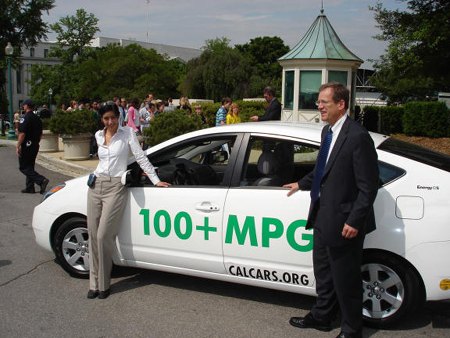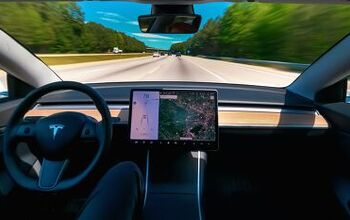New Energy Bill Dooms Carmakers to Failure
2020. That’s the year by which all automakers selling vehicles in the United States must [now] achieve a Corporate Average Fuel Economy (CAFE) of 35mpg. The symbolism is strictly ironic. The politicians who crafted the new Energy Bill hardly displayed 20-20 vision. They singularly failed to see that their well-meaning efforts to force Americans to conserve fuel by forcing manufacturers to produce fuel efficient vehicles evokes the law of unintended consequences. While it’s impossible to see the future with perfect clarity, there are obvious “unforeseen” pitfalls.
Let’s start with the legislation’s basic assumption: automakers can create a range of vehicles with a combined fuel economy of 35mpg. Ostensibly, there’s no need to reinvent the wheel (and everything attached to it). All carmakers have to do is build and sell more vehicles like the ones that already achieve the requisite target. According to the official EPA website, only two cars sold in the U.S. literally fit the bill: the Honda Civic Hybrid and the Toyota Prius. Uh-oh.
First, both cars are niche products; the vast majority of American consumers prefer to drive something else. That reality creates a strange paradigm. Any automaker that doesn't meet the new standards has a far better chance of selling vehicles and making money than one who does. If the CAFE fines are lower than the profits generated by ignoring the standards, auto execs wishing to maximize shareholder value must turn their backs on the legislative directive, pay up and get on with it. To wit: BMW and Mercedes' current CAFE fines.
Second, the Prius and Civic hybrid both use proprietary technology. Detroit doesn’t possess the necessary gas – electric expertise to replicate their mpg results. To think that The Big 2.8 can catch-up with Toyota and Honda in 12 years, never mind overtake them, is a leap of faith without historical basis. Yes, this dilemma is Detroit’s own damn fault. But Ford, GM and Chrysler are already teetering on the abyss. This legislation is a shove in the wrong direction.
Third, the Prius and the Civic Hybrid's towing capacity is listed as“not recommended.” While I’m sure there are plenty of environmental campaigners who’ll be happy to learn of the Energy Bill’s de facto death sentence for SUVs, the economic impact of neutering pickup trucks' load carrying and towing capacity would be dramatic.
The argument against this line of thinking: automakers will now race to develop technological solutions that will raise their CAFE numbers by 40 percent without sacrificing comfort, performance, price, practicality, towing, safety or reliability. Call it the “if we can put a man on the moon…” school of thought.
If we accept this metaphor, Japan is America with a ten year lead. Detroit is Communist Russia. Ford is bankrupt. Chrysler is bust downsizing for re-sale. And even if Chevrolet’s Volt turns out to be a stunning technological triumph, there’s little chance GM can convert their entire passenger and light truck lineup to lithium-ion battery-aided propulsion— and get people to buy the result— by 2020. That said, GM may not have to Volt-up the whole fleet; the National Highway Traffic Safety Administration might agree to some highly advantageous mpg calculations for plug-in gas – electric hybrids; a new formula that will help off-set the rest of the fleet's low-mileage stats.
The potential for finagling on CAFE raises the automakers’ most obvious “solution” to Congress’ “solution” to our dependence on foreign oil: cheating. The new Energy Bill extends the ethanol credits that inflate automakers’ EPA stats based on almost entirely theoretical E85 use. I have every confidence that Representative John Dingell (D-Michigan) secured plenty of exemptions, exceptions and get out of jail free cards for his Detroit constituents.
For example, the Detroit Free Press reports that “Money generated from fines that luxury automakers would receive for missing fuel-economy standards are to be given to automakers that retool old factories for building models with advanced technology.” If we assume the “luxury automakers” bit is Freep conjecture, this rider could mean that automakers who violate CAFE can use their own CAFE fines to fund new product development. How great is that?
The way I see it, either this Energy Bill will defeat Detroit, or provide enough loopholes and clever caveats to render its 35mpg target meaningless, or simply fail under the weight of its own unrealistic expectations. At the end of the proverbial day, legislation that attempts to control the free market on this scale is doomed to failure. There's only way this will work: if the free market heads in the same direction at the same time– allowing legislators to claim credit for events they didn't create or control.
Of course, I could be completely wrong. Perhaps the Energy Bill will usher in a golden age of environmentally friendly automobiles. Wanna bet?
More by Robert Farago
Latest Car Reviews
Read moreLatest Product Reviews
Read moreRecent Comments
- 1995 SC I will say that year 29 has been a little spendy on my car (Motor Mounts, Injectors and a Supercharger Service since it had to come off for the injectors, ABS Pump and the tool to cycle the valves to bleed the system, Front Calipers, rear pinion seal, transmission service with a new pan that has a drain, a gaggle of capacitors to fix the ride control module and a replacement amplifier for the stereo. Still needs an exhaust manifold gasket. The front end got serviced in year 28. On the plus side blank cassettes are increasingly easy to find so I have a solid collection of 90 minute playlists.
- MaintenanceCosts My own experiences with, well, maintenance costs:Chevy Bolt, ownership from new to 4.5 years, ~$400*Toyota Highlander Hybrid, ownership from 3.5 to 8 years, ~$2400BMW 335i Convertible, ownership from 11.5 to 13 years, ~$1200Acura Legend, ownership from 20 to 29 years, ~$11,500***Includes a new 12V battery and a set of wiper blades. In fairness, bigger bills for coolant and tire replacement are coming in year 5.**Includes replacement of all rubber parts, rebuild of entire suspension and steering system, and conversion of car to OEM 16" wheel set, among other things
- Jeff Tesla should not be allowed to call its system Full Self-Driving. Very dangerous and misleading.
- Slavuta America, the evil totalitarian police state
- Steve Biro I have news for everybody: I don't blame any of you for worrying about the "gummint" monitoring you... but you should be far more concerned about private industry doing the same thing.


































Comments
Join the conversation
RF Penned: The potential for finagling on CAFE raises the automakers’ most obvious “solution” to Congress’ “solution” to our dependence on foreign oil: cheating. Right you are, sir. Sometimes I wonder if Congress is really uneducated after all, or if they are just crooked. But then the really scary thought intrudes my consciousness: What does that say of the people who keep re-electing these boobs? Michigan keeps re-electing Dingell term after term after term. Does it help Michigan? I don't know, but it sure hurts the nation. Politicians like to say that they are for the "little guy," but the fact is that government usually stands in the way of progress. This was understood by the Founding Fathers, who created the Bill of Rights not to list the rights of the people, but to LIMIT the abilities of an overreaching government. The Founding Fathers were 100% correct in their fears. However, I think they didn't go far enough to prevent that which they feared most (a collapse/takeover from within), because government intrusion continues to worsen each year.
Adding huge gas taxes will acomplish nothing. It will only hurt the average joe who has no choice but to commute to work with a car. Where I work the public transportation is almost non existant. Rich people will continue to drive with a tax. The US industry wouldnt be where it is if it actually looked at trends instead paying dividends. Shure SUVS are profitable, but now demand for them is leveling off. Ford and GM still don't get it. Ford sales are off because they don't market their cars - every time you see and ad for a Ford it is for a truck not a car. It's like all American makers sell is trucks. And excoriate GM, Ford and Chrysler for shoving trucks down our throats...but Honda and Toyota are JUST as bad with the LX470, Sequoia, Tundra, Pilot and Ridgeline. Detroit can meet the challenge; they don't have a choice.